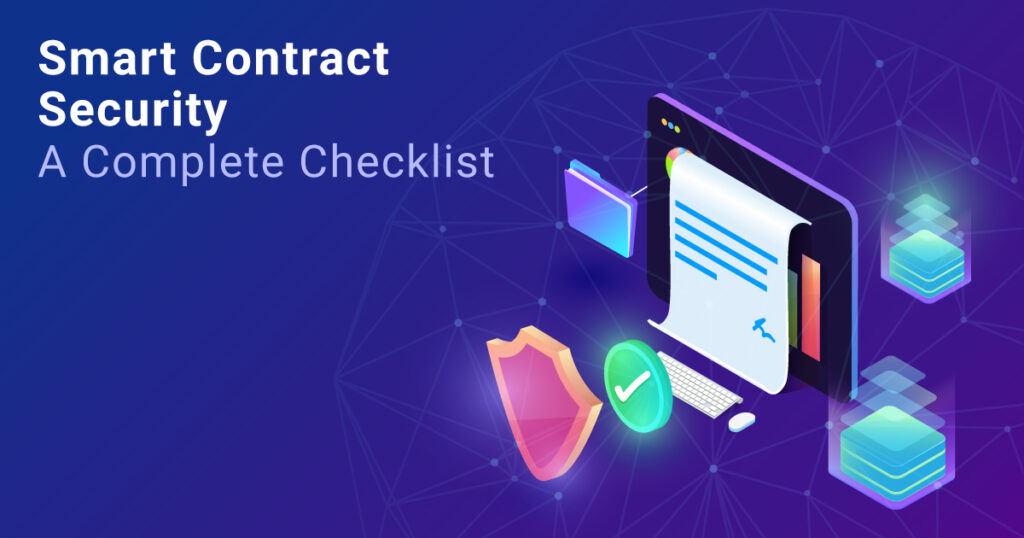Blockchain is supposed to be secure for everyone. Is it the reality?
According to reports, 5% of blockchain smart contracts were susceptible to funding lock, information loss, and user data leakage. Even Ethereum, the largest network, acknowledged that more than 32,000 smart agreements worth $4.4 million posed a security risk.
Thus, we cannot emphasize enough that smart contract security will always be on the hitlist of swindlers, and they will exploit the vulnerabilities as per their wishes whenever they get an opportunity.
Only the best smart contract security auditors can rescue you from the vulnerabilities in your smart contracts. This is because they stick to a fixed auditing checklist that assists them in carrying out the auditing process smoothly. Now that they have an expertise in this field for many years, they ensure the safest auditing process for clients all over the world.
This article will discuss the step-by-step audit checklist that will save your funds from leaking. So, without any further ado, let us get started.
The smart contract auditing checklist
Each smart contract consulting firm’s checklist will be the same, with slight variations. There are several parameters that decide this variation.
These are the steps involved in the checklist. Make sure to follow them, if you wish to avoid leakage of your funds.
1. Preparation
Preparation is the first step that helps in saving a significant amount of time and effort in putting the entire process together. This is the step upon which the entire auditing process depends upon.
First, the auditors begin by defining the scope, criteria, parameters, etc., of the audit. Then they move ahead with the project documentation that gives them information about how the blockchain has been built and tested.
2. Core checks
After this, the smart contract auditors work on planning the audit. They do this by carrying out the core checks, which are as follows:
Underflow and overflow preventions
Using the latest versions of solidity, they change the verification
Function visibility
Frequently updating the constructs of old solidity.
Fix the nuance warnings to eliminate the problematic features
Use push payments
Check the external calls like short circuits or reentrancy.
Combat with unbounded loops
Use trustworthy and audited dependencies
Validate external or public functions
Time manipulation within several minutes only.
Cutting down on pseudo-randomness
These are some of the high-risk areas that have always been the favorite target of attackers.
3. Testing and Software Engineering
With all the above-discussed core checks in mind, the auditors accordingly work on building the test cases. They do it either manually or using testing tools to automate the process.
These are some of the points that they check.
Test coverage for 100% of branches
Freeze recent code that has been written under a tight headline
They run unit tests to cover critical edge cases.
Carry out some additional tests for integrations
4. Resilience
You might have seen how any blockchain easily adapts to numerous chaotic situations. This capacity of a blockchain is known as resilience.
The next step to ensure smart contract security is to test resilience. The auditors test the load, endurance, recovery tests, and compliance to be sure that the blockchain is working smoothly and can recover instantly, even if there is any interruption or disturbance.
5. Auditing
Several steps are involved in the smart contract auditing process. All of this depends on how complex the project is, the experience of the development team, etc.
Auditing is not just about verifying the code; it is a complete analysis of the code wherein the auditors create a report with everything about the bug and recommendations from their end on how to fix those bugs, potential changes that can bring improvement to the blockchain, and coding practices.
These are the most crucial points in a smart contract consulting firm’s auditing checklist. With these points in mind, the auditors carry out the process smoothly and help users create a safer blockchain ecosystem.
Now that you are thorough with the audit checklist, you might be wondering how to apply this checklist. So, here we are with the answer to your question.
Additonal Read: How To Develop A Dapp
How to apply the checklist to ensure smart contract security?
Having this checklist with you is a good start. However, following it isn’t a cakewalk! If you have an in-house development team, you can still stay calm. Else, you will have to spend a lot on hiring experienced auditors, developers, and testers. It will also take a lot of time to train them.
Instead, going for the best smart contract security audit company can do wonders for you! The auditors in these firms are thorough with the audit checklist and have tried their hands at different projects. They will help you apply the checklist to enhance security, and you don’t even have to worry about the nitty-gritty of auditing.
You can directly hire auditors from ImmuneBytes. It is a leading smart contract auditing firm that helps people to combat cybersecurity vulnerabilities in their smart contracts. Over the years, they have stood strong in the industry and worked diligently to create a safe financial world for blockchain users.


